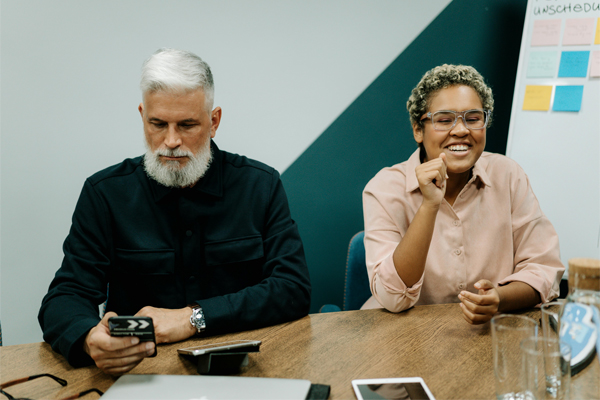Despite increasing discussions around the importance of male allyship on workplace inclusion, only 37% of men actively step up as allies, a new study has revealed.
Even fewer possess the skills or confidence to step up as active allies, capable of taking meaningful action, highlighting a critical gap in workplace inclusion efforts. While diversity, equity, and inclusion (DEI) efforts have made progress, exclusion remains one of the biggest challenges faced by women and historically marginalised groups.
The research on male allyship compiled by diversity and inclusion experts has shed light on how men perceive DEI at work, their role in fostering inclusive environments, and the concrete steps they are (or aren’t) taking to support underrepresented colleagues and become better allies.
Key findings from the report show that:
- 97% of allies reported that their leadership skills and overall personal development improved due to allyship.
- 53% saw measurable business improvements as a direct result of allyship initiatives, though 45% remained unsure of the impact.
- 37% of men actively engage as allies in the workplace.
- 63% believe they receive adequate support to succeed in their roles.
MALE ALLYSHIP AT WORK
Interestingly, the male allies that participated in the study consider themselves to be allies to multiple underrepresented groups. For example:
- 96% advocate for women.
- 81% support colleagues of different ethnic backgrounds.
- 77% stand with LGBTQ+ individuals.
- 70% support those from lower socioeconomic backgrounds.
- 69% are allies for neurodivergent colleagues.
- 66% advocate for individuals across different age groups.
- 63% support disabled colleagues.
- 58% identify as allies to other men.
- 55% support non-binary individuals.
So what drives men to be allies? The study found several key motivators for men stepping up as active allies in the workplace. The top reasons included:
- A strong sense of fairness, equity and justice.
- Personal experiences, such as fatherhood or family impact.
- Deeply ingrained moral and ethical values.
- First-hand experiences of exclusion.
- Witnessing the lack of diversity and its consequences.
- Understanding the systemic disadvantages that affect men as well.
MALE ALLYSHIP IN ACTION
The study also found that active male allies, step up and engage in several meaningful ways. For example:
- 91% educate themselves on bias and the experiences of marginalised groups.
- 81% engage in direct conversations with women and other marginalised colleagues to better understand their realities.
- 73% reflect on their privilege as men.
- 30% participate in reverse mentoring or co-mentoring programmes.
The male allies interviewed in this research also shared what good male allyship looks like in action. For example:
- 77% actively promote the importance of DEI in their organisations.
- 68% call out inappropriate behaviour in the workplace.
- 63% role model inclusive behaviours, such as flexible working or taking paternity leave.
- 62% step back to create space for underrepresented voices.
- 53% mentor or sponsor diverse talent.
- 52% lead conversations on workplace exclusion.
- 39% embed DEI initiatives into corporate structures.
- 37% recruit other men to become allies.
- 35% provide financial support or resources to DEI organisations.
- 31% join Employee Resource Groups (ERGs).
MALE ALLYSHIP CHALLENGES
Despite some progress, the research highlighted that many challenges continue to prevent men from being effective allies at work. Some of the biggest barriers include:
- Fear of saying the wrong thing.
- Struggling to call out inappropriate behaviour.
- Challenging personal biases and behaviours.
- Judgment from other men.
- Lack of time, training, and tools.
- Fear of being blamed or seen as part of the problem.
- Lack of leadership support and prioritisation.
PRACTICAL RECOMMENDATIONS
Compiled by a group of DEI consultants, the report offers a snapshot of current allyship trends and practical recommendations for organisations looking to create long-lasting change. Commenting on the report, Robert Baker, Founder of Potentia Talent Consulting, said: “My biggest takeaway is how much more companies need to be doing to engage men in inclusion: provide safe spaces for men to share their feelings and views in a safe environment, educate them on what it means to be an ally and the benefits for them from inclusion, and ensure leaders are supportive and make this a priority.”
Hira Ali, CEO of Advancing Your Potential, believes that the report provides valuable insights into allies’ perspectives and is a crucial resource for organisations aiming to design and implement effective allyship programmes. “It was especially enlightening to gain a deeper understanding of the motivations, barriers, and challenges allies experience – particularly those that are often overlooked or underestimated,” shared Ali.
According to Lee Chambers, Founder of Male Allies UK, “We are in a pivotal time where division is increasing, and resistant voices feel emboldened to challenge”. Bringing people together requires creating access, space to explore, and an understanding of what motivates change. Allyship is an increasingly valuable skillset in times of volatility. And all skills need places to be built.”
DRIVING CHANGE THROUGH ACTIVE ALLYSHIP
Harriet Waley-Cohen, Inclusion & Leadership Trainer, believes that men have the greatest power to drive change in corporates, and inclusive cultures deliver results. “As pushback against inclusion grows, understanding men’s hesitations in allyship is crucial. This report explores these barriers and how to support inclusive leadership while addressing fears of being cancelled,” she noted.
“This research reinforces my belief that we need to be more intentional,” added Alan De Bruyne, Founder of Diversito. “When I see the number of those who actively practice allyship, it is striking. Good intentions aren’t enough – we need consistent action. We must build in nudges that keep allyship top of mind, ensuring it becomes a habit rather than just a label. And it all starts with ourselves. Now.”
“This report has been a game-changer for me,” concluded Daniele Fiandaca, Founder of Token Man Consulting. “Rather than focusing solely on recruiting more allies, we first need to educate and empower those already leaning in – because it’s clear they could be doing so much more. Once they have the confidence and tools, part of their role must be bringing more men into the conversation. That’s how we create systemic change.”
This report highlights the transformative potential of male allyship. For companies serious about DEI, the next step is clear: equip men with the confidence and resources to drive real and lasting change. Now is the time for action.
You can read the full report, by clicking here.






































